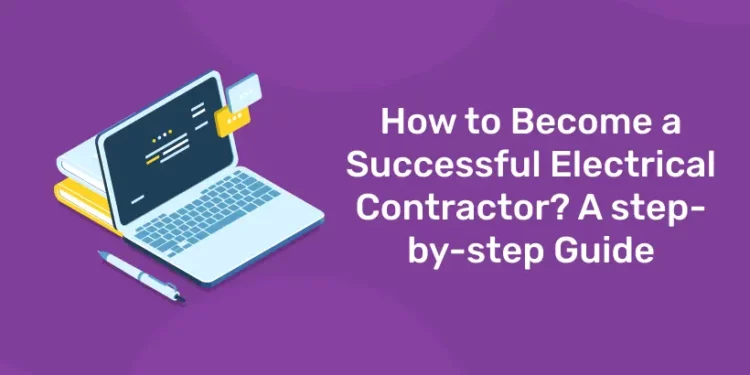Table of Contents
Being an electrical contractor is an excellent career option for people who enjoy hands-on work and like to solve technical problems. The job of an electrical contractor involves the installation and repair of the electrical machinery that provides power in the building. Before making the final decision in choosing being an electrical contractor as your career you should know what all the job entails. You should also have a brief idea of how to become a successful electrical contractor. All the essential details a student needs to know before choosing the career of becoming an electrical contractor are given in this article.
Make your career as an MEP draftsman! Sign up for the course now!
Who is an Electrical Contractor?
An electrical contractor can be defined as a licensed professional who works with electrical equipment to power various establishments like houses, offices, businesses etc. The setting of their work can range from wiring a family house to setting up the machinery in industrial plants. They work in collaboration with engineers, architects and clients to make sure that the electric systems installed are safe, efficient and compatible with local guidelines.
The area they work in can vary according to their specialisation, their employer’s demands and the specifications of each job they take. Their main task is to install, maintain and repair electricals. But they are also qualified to hire electricians for their own business or for the firm they work for. You should also stay updated on the latest technicalities and innovations happening in the industry and adapt them to your work. For this, you can arrange skill training for your staff and attend various courses yourself.
What is The Job Profile of An Electrical Contractor?
The job of an electrical contractor involves the following things.
- Installation and maintenance of electricals
- Doing the allotted administrative duties
- Providing good quality customer service
- Driving to various locations to meet clients or to transport equipment
- Preparing and reading blueprints
- Consulting with clients
- Handling the paperwork
- Estimating costs
- Scheduling the appointments
- Inspecting the equipment regularly or when called
- Repair the ageing parts if possible. Otherwise, replace them
- Restoration of the electric system functions
- Work involves the usage of power tools and moving heavy equipment
- Installing of wiring
- Working as a part of the team as well as an individual worker
- Climbing to heights and using ladders
- Upgrading wiring in old buildings
- Handling the insurance companies
Always keep in mind that the work of an electrical contractor is quite dangerous and hence strict safety guidelines need to be followed for your protection as well as that of your clients.
Differences Between an Electrical Contractor and An Electrician
It can be seen that some businesses use the job titles electrical contractor and electrician interchangeably while others insist on clear differentiation. Most simply, we can say that an electrician is an individual who installs and maintains electrical while an electrical contractor is a businessperson who can do these works on their own but also can hire various electricians to work under them. An electrical contractor is a licensed professional while an electrician is not.
How much does an Electrical Contractor Make?
The mean income of an electrical contractor in India is around ₹ 4,07,215 annually. This can undergo a massive variation according to their education, experience, specialisation and even employment location and employer.
How to Become a Successful Electrical Contractor? A step-by-step Guide
on the steps that you need to follow to become a Successful electrical Contractor is given below.
Education
To follow this career path first you have to complete your higher secondary education. Then you can go for ITI or a diploma in electrical engineering. You can even go for an engineering degree but many may consider it unnecessary for this career. Going to trade school is considered the best course of action. But it is your choice to decide how much time and money are you going to spend on your education. You can meet an academic councillor to discuss these things. Other certifications related to the field can also be taken up after completing the ITI or Diploma. Here is where you should learn about Entri Apps’ latest MEP course. This course provides all the training that is necessary to become an MEP draftsman. They provide the following things.
- forty hours of recorded classes
- live classes every week
- mentorship for 6 months
- site visit in India or the Middle East
- live projects based on the Middle East
- valuable certification
- placement assistance
Join today itself to get the career-oriented training as well as practical experience you need to become an MEP draftsman. Get a placement in top companies and fly high in your career.
Learn to be an MEP Draftsman under the best tutors in the industry!
Apprenticeship and Training
Your education already provides you with the needed theoretical knowledge and some practical experience in the field. But this is not equivalent to the actual work experience you gain while working. If you do course. Like the MEP course of Entri App has site visits, mentorship, live projects and placement assistance, you will be directed to the training with ease. Other you will have to seek out apprenticeship opportunities on your own under experienced contractors or in companies prominent in this field of work. During your apprenticeship period, you will work under the guidance of your seniors who have a whole lot of experience in their professional inventory. This will help you gain practical knowledge and hands-on experience. Here you will gain industry exposure make contacts and build a network among professionals.
Find Ideas and Objectives
Once you have gained the experience and have done some networking in the industry, you can start thinking about starting your business. But before this, you have to have a clear idea about your objectives. These are the ideas that are going to build the foundation of your business. So, think and take your time to come up with them. Some key points that need to be considered are given below.
- Find your target market. Think about your ideal customer and then brainstorm the services they might need. Now you can decide on your marketing plans and pricing strategies. Have a thorough understanding of market and industrial trends before starting the plans.
- Analyse the levels of competition. Look into the details of businesses that could be a competition to you. Now think about what can you do that makes you stand out from them. Find some offers and services that are unique that you can offer.
- Clearly define the services you are going to provide. Are you going to provide services to residential settings or for big-scale industrial settings? Are your services going to involve that involves installation of new devices or the one which involves maintenance and repair of old ones? Be as specific as possible.
- Decide the mission of your establishment. Stick to its target and values
- Be flexible and adapt according to changes in the market and trends.
Enrol in the best MEP draftsman course of 2024! Click to watch the Demo classes!
Formulate a Business Plan
Coming up with a good business plan can benefit you in several ways. This will outline your business plans, and the goals of your business, and give an approximate of the startup costs and expected income. It can also help you get good funding, attract many investors and hence attain success. The factors you have to think about while formulating the business plans are listed below.
- Company Description: detailed description of the company’s target market, products sold, services offered and unique schemes you offer.
- Executive Summary: An outline of the firm’s business plan that has its vision, objectives and goals
- Service or Product Line: description of products to be sold and services to be offered.
- Market Analysis: extensive research to find industry trends, competition faced and market nature.
- Marketing and Sales Strategies: plans of advertising, networking and promotions done for the company.
- Financial Projections: outline of startup costs, expectations in cash flow, revenue statements, balance sheets and other types of financial data.
- Funding Strategy: plans on how you are going to manage securing required financing.
- Management and Organization: outline of the team structure, business model and how to manage day-to-day operations of the business
Formulating a Financial Model
Here is where you make estimations about your financial performance by considering factors such as target market, pricing strategy etc. A financial model of a business should include the following things.
- Cost of sales: based on sales projection and pricing strategy expenses for materials, goods and labour are estimated
- Revenue projections: calculates the income expected based on pricing, sales strategy market trends etc.
- Operating expenses: overhead expenses like rent, marketing expenses, utilities and insurance are calculated.
- Balance sheet: outline the financial position at the time showing equities, revenue and liabilities.
- Income statement: a summary of costs of sales, revenue and expenses of operation to calculate projected net loss or gain.
While constructing a business model and financial model. Always remember to be realistic. Make use of professional tools and discuss your ideas with mentors, business owners and professional consultants.
Choose the best MEP course for building your career! Join today!
Find the Funding Needs
A business needs enough capital to be set up and for maintenance, until it starts generating enough revenue to be self-sufficient. Factors like startup costs, working capital and emergency funds need to be considered.
Finding the Fund Sources
You have to look for potential sources to attain your funding. Here you have to consider ideas like using personal savings, taking up loans, attracting investors and crowdfunding.
Decide the Legal Structure
You have to decide the legal structure of the company because this plays an important role in determining the tax obligations, operation models and even liabilities of your firm. A few options that can be considered are:
- Sole proprietorship
- Limited liability company (LLC)
- Partnership
- Corporation
Getting the Licenses and Permits
You have to obtain all the necessary licenses and permits. This is to ensure that your business is operating legally. This also acts as a protection against lawsuits and penalties. You have to make sure that the electricians working under you also have the necessary certifications and licenses. There might be differences in the guidelines in different states and localities. So please be aware of that. You also have to be aware of the changes that might come to requirements for a licence and adapt accordingly. If any of them requires renewal from time to time, then you have to keep track of that too. It is essential to start the licensing process as soon as possible as this may take up a good time. The basic permits needed for electrical contractors are given below.
- Business License
- Electrician’s License
- Contractor License
- Building Permit
Get Placement assistance in the MEP sector! Enrol in the Entri MEP course!
Get the Required Insurance
Insurances are necessary for running an electrical contractor business to protect your firm and employees from possible accidents, hazards and liability claims, before choosing one, research and compare the policies given by different service providers. Never skip insurance coverage for petty money. This will cost you later in life. You can even consult an insurance broker or similar agent to make sure that your company has the right kind of coverage. The necessary insurances are listed below.
- General Liability Insurance
- Business Auto Insurance
- Workers’ Compensation Insurance
- Bonding Insurance
- Professional Liability Insurance
Find Workers, Material Supply, Equipment
Now that the business is established you have to find contractors, skilled workers and suppliers who will provide you with good quality materials at the correct price at the correct time. This is what helps you run your business efficiently and smoothly. It is also important for an electrical contractor business to invest in high-quality equipment because it is a matter of safety for your company, workers and your clients. Some much-needed equipment is:
- voltage testers
- multi meters
- cable locators
if you feel that you don’t have much use for equipment in your specialisation of work then you can rent or lease it only when necessary. Buying equipment that is not of much use is just a waste of money. To get all these resources networking is necessary. So, attend the events in the industry and join the industry associations. Also, make sure that you have good connections with the local hardware stores and supply companies.
Execute a Marketing Strategy
Like any business, marketing is necessary for an electrical contractor firm too. Given below are ways in which marketing of your firm can be done.
- Identify your ideal customer and target market and develop your brand image accordingly
- Create a marketing plan and prepare the budget
- Develop a website with the details of your business, contacts customer reviews and testimonies.
- Use the social media to promote your business. Have business pages on Facebook, Twitter, Instagram etc so that information about your business can reach a wider range of customers. You can even hire a social media manager.
- Always give good customer service. This is the key to positive reviews about your business. The name of your firm will be passed by word of mouth. Many people even recommend your business to others.
- Sponsoring local events and getting involved with community activities are excellent ways of getting the name of your business out there.
Manage your Finances Appropriately
Having a very good financial management system is essential for the smooth running and success of a business. Some steps to build an efficient finance management system for your business are provided below.
- Draw up a rough estimate of the startup cost. This includes the price of materials, vehicles, equipment, infrastructure, licence fees and many other costs that are needed at the beginning of the business
- Create a good business plan.
- Develop an efficient book keeping system
- A separate bank account should be set up for business purposes
- Choose the accounting method most suitable for you. This could be a cash-basis method or an accrual-basis method.
- Prepare a budget and estimate profits before acceptance of each project
- Keep an eye on the cash flow
- Keep track of your debts. Make regular payments if you have any. Also, make sure that you do not take loans that you are sure you can not pay off.
All the essential knowledge one needs to have before becoming an electrical contractor is discussed above. Enrol in the MEP course provided by Entri App to make the career beginning smoother and to get the best opportunities in the MEP and Electrical sector
How to Become a Successful Electrical Contractor? A step-by-step Guide FAQs
- Is it essential to have a license to work as an Electrical Contractor?
Yes. It is necessary to have a license from the correct government authoritative body to legally work as an electrical contractor in India.
- Can one become an electrical Contractor without experience?
The simple answer is yes. No prior experience is required to be an electrical contractor. However, it is absolutely unlikely that anyone would hire an inexperienced electrical contractor to work on their projects. Years of practice and wide networking are necessary to get work and be successful as an electrical contractor.










